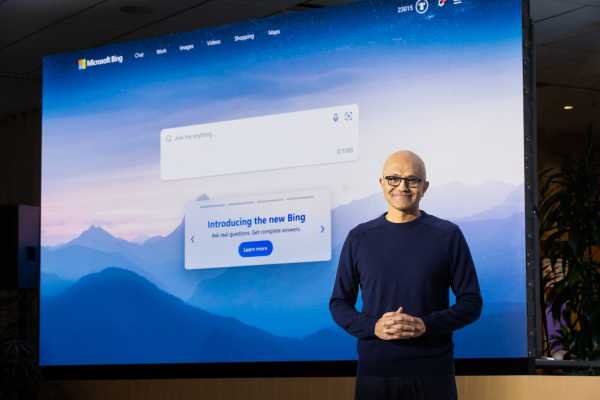
Sara Morrison is a senior Vox reporter who covers data privacy, antitrust, and Big Tech’s power over us all.
This story is part of a group of stories called

Uncovering and explaining how our digital world is changing — and changing us.
Microsoft has officially taken the lead in the race to build a search engine powered by generative AI. On Tuesday, the company debuted the rumored OpenAI-infused versions of its Bing search engine and Edge web browser, proclaiming them to be the next evolution of the internet — an evolution that so far seems to be crafted by Microsoft. Not Google.
“AI will fundamentally change every software category, starting with the largest category of all — search,” Microsoft chairman and CEO Satya Nadella said in a statement.
Microsoft is calling the new AI-powered Bing and Edge your internet “copilots.” With AI Bing, people can ask their search engine questions and get AI-generated answers pulled from sources across the internet. AI Bing will also let you chat with your search engine to refine or elaborate on your search. Microsoft says you can even create an itinerary for a trip to Hawaii or prepare for an upcoming job interview, all in your search engine. Even those dusty old traditional search results should be better, too, thanks to an AI boost to the search algorithm that is supposed to return more accurate and relevant results. Meanwhile, the new Edge browser will also feature AI, including a sidebar that can give you a summary of what you’re looking at or help you write a message to post on it. Microsoft’s example was a post on Microsoft-owned LinkedIn. Seamless!
Google had tried to get ahead of Microsoft’s announcement with one of its own the day before. In a blog post authored by CEO Sundar Pichai, the company revealed that its ChatGPT competitor was named “Bard,” and that it would be rolled out to the public in the coming weeks. Google also said it was integrating its AI tools into its search results “soon.”
Bard and the new Bing seem pretty similar on the surface. But it’s hard to say without trying them, and neither is available to the general public yet. They’re both rolling out in the next few weeks. But while Bard is built on a “lightweight” version of its generative chatbot for now, Microsoft says the new Bing will use an even more powerful version of ChatGPT that was custom designed for search. And while Bard was introduced in a short blog post, Microsoft invited a ton of journalists to a splashy live event at the company’s headquarters in Redmond, Washington, to show off its AI-powered Bing and Edge. This all suggests that one company thinks its AI search is ready for primetime, while the other is just trying not to be left out of the conversation completely.
Microsoft also has a considerable hill to climb when it comes to making Bing a serious competitor to Google, which is far and away the most-used search engine in the world. Google is synonymous with web searches, and habits are hard to break. New Bing will have to offer something special to win Google users over. Same goes for Edge, given Chrome’s massive browser market share — a throne that once belonged to Microsoft’s Internet Explorer.
Perhaps unsurprisingly, OpenAI CEO Sam Altman was also onstage when Microsoft announced the new Bing. Microsoft has partnered with OpenAI and has invested $13 billion in the company. The new Bing and Edge browser are just a couple of the results of that investment, but they are the most consumer-facing ones so far. While OpenAI isn’t the first or only company to create a large language model chatbot, its decision to release ChatGPT to the public while Google and Meta held their own chatbots back has made it appear to be the leader. Now everyone else has to catch up. And now they’ll be catching up to Microsoft, too.
Microsoft is aware of and, it seems, very much enjoying that fact. At Tuesday’s event, there were several not-so-hidden shots fired at Google, with Microsoft executives proclaiming that search hadn’t changed or advanced much in the last 20 years. (That isn’t really true; Google’s search results page, often crammed with sidebars and answers and ratings and maps, looks quite different from the simple list of links it was two decades ago.) The Microsoft executives added that search just doesn’t work as well as it could or should for most people. It was time, they said, to bring innovation back to search.
If you want to try the new Bing for yourself, Microsoft has a preview on its site, and you can join the waitlist to be one of the first people to try it out for real. Microsoft says that, in the coming weeks, it will roll out to “millions” of desktop users, and a mobile version is coming “soon.”
As for which big tech company has the better AI-infused search engine, we’ll have to try them and see. Both Microsoft and Google are surely rushing their products out as soon as possible. You don’t need a sophisticated generative AI chatbot to tell you how important it is to be first.
Sourse: vox.com